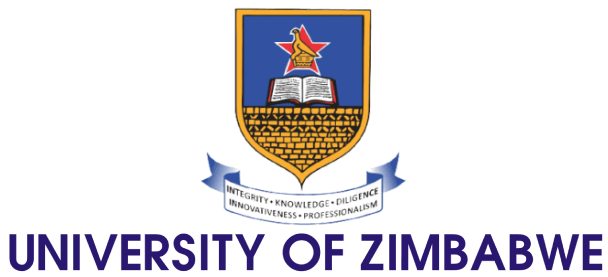Unit Coordinator
Terence Nyamayaro
Qualifications: MSc Medical Biochemistry (UK), SDMLT (Clinical Chemistry UZ), DMLT, Lab MGT
email: This email address is being protected from spambots. You need JavaScript enabled to view it.
MSc Program Coordinator and Senior Lecturer
Dr Cuthbert Musarurwa
Qualifications: (DPhil Chem. Path., MSc Clin. Epi, MSc Clin Bio, Spec Dip MLT (Clin Chem), GDMLT)
email: This email address is being protected from spambots. You need JavaScript enabled to view it.
Clinical Chemistry Consultant
Professor ZAR Gomo Professor
Qualifications: PhD, University of Birmingham, MSc, University of Birmingham, BSc, University of Surrey
email: This email address is being protected from spambots. You need JavaScript enabled to view it.
Clinical Chemistry Consultant
Professor Hilda Tendisa Marima-Matarira
Qualifications: PhD, University of Edinburgh, MSc, University of Warwick, BSc, University of Zambia
email: This email address is being protected from spambots. You need JavaScript enabled to view it.
Llyod Boora
Qualifications: MSc Clinical Biochemistry, University of Zimbabwe
email: This email address is being protected from spambots. You need JavaScript enabled to view it.
MBChB/BDS III programme coordinator
Mr. Itai James Blessing Chitungo
Masters in Business Administration (MBA), MSc Clinical Biochemistry (MDCB), Certificate in DNA and Forensic Science, Bachelors in Medical Laboratory Sciences Honours (HBMLS)
email: ichitungo@ medsch.uz.ac.zw
Ms. Brenda Nherera
Qualifications: MSc Clinical Biochemistry, University of Zimbabwe, HBMLS, University of Zimbabwe
email: This email address is being protected from spambots. You need JavaScript enabled to view it.
Donald Vhanda
Qualifications: MSc Clinical Biochemistry, University of Zimbabwe, HBMLS, University of Zimbabwe
email: This email address is being protected from spambots. You need JavaScript enabled to view it.
Chief Medical Laboratory Technologist
Constance Samuwi
Qualifications: SDMLT (Clinical Chemistry UZ), DMLT, MSc Clinical Biochemistry, University of Zimbabwe
email: This email address is being protected from spambots. You need JavaScript enabled to view it.
Honorary Lecturer
Professor Donald Tanyanyiwa
Qualifications: Fellowship; Institute of Medical Laboratory Science Zimbabwe, 1992, Fellowship; College of Pathologists (FC Path) South Africa, 2004, Masters of Medicine Chemical Pathology (MMed) Path; UCT, 2005, Fellowship; College of Pathologists (FC Path) ECSA, 2014, PhD Human Genetics (UCT 2019)
email: This email address is being protected from spambots. You need JavaScript enabled to view it. (This email address is being protected from spambots. You need JavaScript enabled to view it.)
Part-time Lecturer
Vinie Kouomau
Qualifications: MSc Clinical Biochemistry, University of Zimbabwe
email: This email address is being protected from spambots. You need JavaScript enabled to view it.
Office Manager
Miss Catherine Ngondo
Qualifications: B Ed, Zimbabwe Open University, Dip Sec Studies, Institute of Languages for Southern Africa (ILSA)
email: This email address is being protected from spambots. You need JavaScript enabled to view it.
